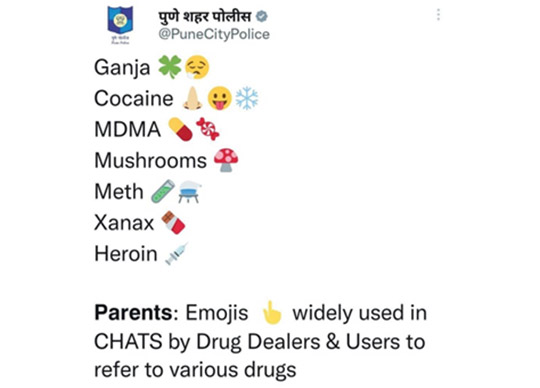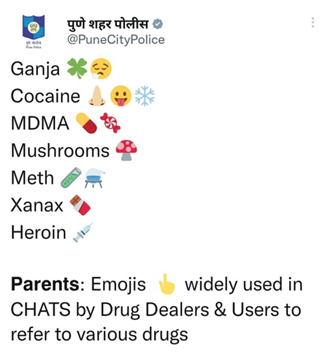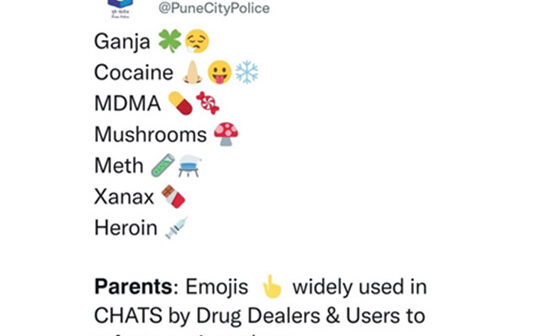

Image: Pune city police.
Written by Sarosh Bana, Mumbai Correspondent.
Few realise that the nondescript emoji – pictograms favoured by social media users in their informal modes of communication – can at times have diabolical connotations, or interpretations.
Police in India recently stumbled upon a criminal angle to the emoji, which actually derives from the Japanese for ‘picture’ (pronounced ‘eh’), plus letter, or character (mōji), and the primary function of which is to fill in emotional cues otherwise missing from worded conversation. Emoji icons variously depict human emotions, living beings, objects and symbols.
Police investigations into drug trafficking cases revealed that drug peddlers and their customers, especially the youth, have been using emojis as a coded language while placing orders for specific drugs.
Police officer Amol Zende was quoted as saying: “We recover WhatsApp chats between peddlers and customers, especially youngsters, and in most of the cases, we find that they are using different emojis while placing orders for specific drugs. The emojis are common in all communications. We have appealed to the parents to be alert regarding such emojis, which are being used to denote the demand and supply of drugs. The use of emojis as codes between suppliers and users has been observed by investigation agencies worldwide.”
Over the past six months, the police in Pune, 150 km from Mumbai, have arrested 82 drug dealers and seized drugs worth Rs7.28 crore (about US$900,000).
The seized contraband included ganja and hashish – hallucinogens obtained from Cannabis sativa, or hemp – the synthetic stimulant drug mephedrone, opium – a depressant drug derived from poppy – cocaine, a stimulant made from the leaves of the coca plant native to South America, brown sugar (heroin), Xanax, the brand name for alprazolam, the fast-acting properties of which can lead to its misuse, Catha edulis or khat (qat) – a stimulant grown as a plant in the horn of Africa, Psilocybin, or ‘magic’, mushrooms, LSD (lysergic acid diethylamide), MDMA (Methylenedioxymethamphetamine, commonly known as ecstasy), and molly, or mandy, a stimulant with psychedelic properties.
The drug problem seems to be on the rise, as Pune police records show that in the two previous years between January 2021 and April 2023, the crime branch had seized illegal narcotics worth over Rs12 crore (US$1.4 million). During this period, 220 cases had been registered across the city and 329 people arrested. Around 80 per cent of the accused were said to be foreigners who were working as drug peddlers in various parts of the city.
The Pune police also ran a campaign on 26 June, which is the International Day Against Drug Abuse and Illicit Trafficking. Besides spreading awareness on social media, officials of the anti-narcotics cells in Pune have been reaching out to students from colleges and schools under a campaign titled, #sayYesToLife#NoToDrugs. The campaign continues for the next one month.
Posting emojis also spelt trouble for 46 employees of state-owned broadband service provider Bharat Sanchar Nigam Limited (BSNL) in Chennai, who were slapped with criminal cases for posting an emoji – of crying with laughter – in reply to a woman colleague’s ‘serious message’ on an official WhatsApp group.
The woman in question, a BSNL divisional engineer, had posted a video clip of three customers airing their views about the company’s network coverage. Assuming the clip to be an attempt to mock the company, the accused countered it by posting “annoying” emojis one after another, said their woman colleague who also mentioned that she felt offended and humiliated.
Acting on her complaints that she filed under the Tamil Nadu Prohibition of Harassment of Women Act, the Scheduled Caste and Scheduled Tribe (Prevention of Atrocities) Act, and Information Technology Act, the police filed a criminal case against the 46 employees.
The accused were, however, bailed out by the court where the judge acquitted all of them, saying, “The face of a crying smiley is to comment about the idea of the complainant in publishing or uploading a video of complaints made by BSNL customers regarding deficiencies in BSNL coverage.” He added that every person had the “indefeasible right” to express what he or she felt. He maintained that an emoji was posted to express one’s feelings about something, and cannot be treated as an overt act against anyone.
A Canadian court, however, did not take such a benign view on emojis, in a case of 2021 that it decided earlier this month. A report by The Guardian mentioned that Chris Achter, a farmer, was ordered to pay a fine of $61,442 by a local court as compensation for not fulfilling a contract that he had ostensibly validated with a ‘thumbs-up’ emoji.
Achter had responded positively to an advertisement of a buyer named Kent Mickleborough in March 2021, which announced his company’s intention to purchase 86 tonnes of flax. An agreement was reportedly made telephonically between Mickleborough and Achter, following which the buyer texted a picture of the contract asking the farmer to “please confirm the flax contract”.
Achter responded to the text message with a thumbs-up emoji, but did not deliver the flax, which prompted Mickleborough to file a lawsuit that claimed the farmer’s breach of contract.
The plaintiff pointed out that Achter’s thumbs-up emoji as a response to the text message signified his agreement with the terms of the contract, while the farmer contended that his emoji was simply meant to convey that he had received the contract, rather than accepted it. “I did not have time to review the flax contract and merely wanted to indicate that I did receive his text message,” he was quoted as saying by the English daily.
While hearing the case, the judge said a thumbs-up emoji was a “non-traditional means” of signing a document, which the circumstances of the dispute rendered it valid in conveying the purpose of a ‘signature’. He dismissed the farmer’s concern that the ruling “would open up the floodgates” to various interpretations of other emojis, including the ‘fist bump’ and ‘hand shake’.
Many deemed the case a miscarriage of justice and one in which the judge was seeking international publicity through his ruling. Some asked whether he would himself sign his verdict with a thumbs-up emoji as a mark of validation. After all, emoji pictograms, by their very nomenclature, are widely considered an informal means of communication and can by no stretch of imagination be treated as a seriously as an official signature. No social media user would believe that a ‘thumbs-up’ emoji in response to a post would bear the legality of a signature.






